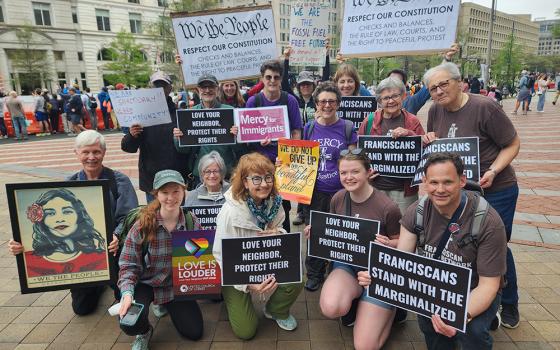Legislation to revive the outdated 1970s Fast Track trade authority process is before Congress. Public interest, faith, environmental, and labor groups oppose its passage because Fast Track would railroad the massive Trans-Pacific Partnership (TPP) trade agreement through Congress, carrying the freight of damaging consequences for millions of people and the environment.
Faith leaders proclaim, ‘Budgets are moral documents.’ Few across the ideological spectrum would disagree - budgets embody our values and societal priorities. Trade agreements are no different.
For over a century, the Catholic Social Justice Tradition has helped guide our national conscience and public policies, and provides a moral framework – rooted in faith and reason – to evaluate Fast Track and the TPP. In this light, Fast Track and the TPP breach moral principles for the sake of purported economic progress and geo-political considerations.
Two of these principles include the right to participate in society’s economic, political, and cultural affairs and the imperative to create an economy that serves the needs of all people, not just the privileged few.
The TPP, a regional Free Trade Agreement (FTA) negotiated among the U.S. and 11 other Pacific Rim countries, is the largest in U.S history, unprecedented in its scope. It will impact 40 percent of global GDP, 1 out of 9 people in the world,, and is larger than all FTA’s previously negotiated.
Moreover, the president is billing TPP as a trade deal that will “write the rules for 21st Century trade,” influencing a similar trade deal with the European Union. Together, these two deals would impact two-thirds of the world’s economy for decades to come.
Accompanying this magnitude is a much greater degree of risk of unforeseen consequences. That risk calls for good measures of prudence, transparency, and informed public debate. Unfortunately, none of these have been present in the TPP negotiating or proposed legislative process.
Since November 2009, the Administration has negotiated the TPP in extreme secrecy under an informal, mock Fast Track process, with restricted Congressional access and without meaningful public input.
Fast Track was developed by the Nixon Administration at a time when trade agreements focused on tariffs and quotas. It guarantees an up-or-down Congressional vote on signed trade deals, with no amendments and very limited debate. It’s referred to as an expedited legislative procedure but in today’s world, Fast Track is an assault on our democracy.
It may have worked for tariffs and quotas, but it doesn’t for the more complex nontariff barriers to trade that significantly comprise trade agreements in our contemporary globalized economy. These include rules that pertain to intellectual property, financial regulations, and health care policy, amongst others, often requiring a change to domestic law. Fast Track is now a 20th Century legislative relic that cannot accommodate the demands of a 21st Century trade agreement consistent with our democratic principles. It needs to be replaced.
Under Fast Track, Congress was intended to establish formal negotiating objectives for the U.S. Trade Representative before negotiations began. That has not happened with the TPP. To date, Congress’s role has been limited to an informal one. They have had no apparent sway on such crucial matters as addressing job-crushing currency manipulation or eliminating the judicially dubious Investor State Dispute Settlement tribunals that too often put corporate profits ahead of the welfare of workers and the environment.
While Congress now tries to catch a train that has left the station, big business has had a comfortable seat near the negotiating table, through the formalized role of the troubling Trade Advisory Committee System that influences the U.S. Trade Representative’s negotiations. The roster of advisors representing business interests, numbering over 500, exceeds that for labor and environmental interests by more than 10 to 1. The TPP negotiations have weighted the arm of Lady Justice toward the dominant self-interest of multinational corporations.
Making matters worse, the passage of Fast Track has always served as a proxy for the passage of trade agreements. While the Fast Track process has been voted down before, once it is has passed, no trade agreement has ever been voted down through this undemocratic procedure.
All of this takes place in an economy that virtually everyone agrees is fraught with inequality, a state of affairs that Pope Francis has called the “root of social evil.” Consider that between the years 2000 to 2013, corporate profits and poverty are up (265 and 43 percent respectively), while median household incomes are down (9 percent).
A former Chair of President Obama’s Council of Economic Advisors, and a proponent of the TPP recently said, “The consensus view now is that trade and globalization have meaningfully increased inequality in the U.S. by allowing more earning opportunities for those at the top and exposing ordinary workers to more competition, especially in manufacturing.”
According to Department of Labor data, at least 5.6 million workers have lost their jobs as a result of international trade since 1994. And the TPP will add to the ranks of afflicted workers, dislocating an estimated 650,000 workers in the manufacturing sector. Additionally, economic research shows that the TPP will likely further depress wages for the average American, even though some wages are likely to rise in selected sectors.
Free trade deals are not free. There are always costs - in this case the costs of inequality, lost jobs, and depressed wages. TPP proponents further undermine their moral position when they fail to adequately address these costs, while only touting the benefits of a Garrison Keeler-like world where everyone earns above average income. The accompanying need for countervailing fiscal measures has been quarantined for political expediency. A politics of half truths cannot serve justice.
International trade benefits the people of the global community and strengthens our sense of human family, but only if it serves the common good. Fast Track and TPP do not.
Today, the downside risks of the TPP in an economy characterized by inequality are too high to legislate through Fast Track. An informed national debate is called for to ascertain the likely intended and unintended consequences and address the needs of those who it will afflict.
The moral refrain of President Obama’s presidency has been, “we are our sisters’ and brothers’ keeper.” This calls us to oppose Fast Track. Everyone counts. The TPP is both an economic and a moral document, and it should be negotiated and legislated as one.
[Mary Priniski is an Adrian Dominican Sister, the former head of the Labor Guild of the Archdiocese of Boston, and currently the vice-chair of Catholic Scholars for Worker Justice. Steven A. Krueger is the president of Catholic Democrats, an organization whose mission is to advance the Catholic Social Justice Tradition within the public square and the Democratic Party.]




